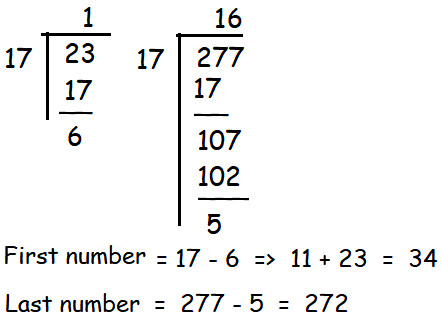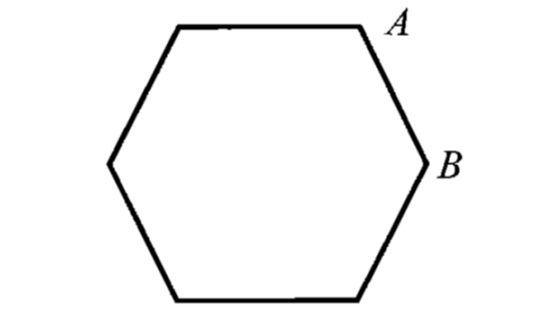GRADE 7 MATH WORKSHEET ONLINE
Question 1 :
The L.C.M of two numbers is 495 and their H.C.F is 5. If the sum of the numbers is 100., then their difference is.
(A) 10 (B) 46 (C) 70
Solution :
Let "x" and "100 - x" be two numbers
Always we have relationship between L.C.M and H.C.F
Product of two numbers = L.C.M ⋅ H.C.F
x (x - 100) = 495 ⋅ 5
x2 - 100 x = 2475
x2 - 100 x - 2475 = 0
(x - 45) (x - 55) = 0
|
x - 45 = 0 x = 45 |
x - 55 = 0 x = 55 |
So, the two numbers are 45 and 55.
Difference between 55 and 45 is 10.
So, the answer is 10.
Question 2 :
Given that 53 + 53 + 53 + 53 + 53 = 5 J and 32 + 32 + 32 = 3N, what is the value of JN?
(A) 12 (B) 18 (C) 4
Solution :
|
53+53+53+53+53 = 5J 5 (53) = 5J 54 = 5J So, the value of J is 4 |
32 + 32 + 32 = 3N 3(32) = 3N 33 = 3N So, the value of N is 3 |
So, JN = 4(3) = 12.
Question 3 :
The difference between the two positive whole numbers is 3.The sum of their squares is 117. Find the two numbers.
(A) 8 and 9 (B) -9 and 6 (C) 7 and 3
Solution :
Let x and y be two numbers
Difference between numbers = 3
x - y = 3
x = 3 + y
Sum of their squares = 117
x2 + y2 = 117
(3 + y)2 + y2 = 117
9 + 6y + y2 + y2 = 117
2y2 + 6y + 9 - 117 = 0
2y2 + 6y - 108 = 0
Divide by 2,
y2 + 3y - 54 = 0
(y + 9) (y - 6) = 0
y = -9 and 6
Hence the required numbers are -9 and 6.
Question 4 :
Given that |(3 - a)| = 2, compute the sum of all possible values of a
(A) 1 and 5 (B) 2 and 4 (C) 3 and 4
Solution :
|
3 - a = 2 Subtract both sides by 3 3 - 3 - a = 2 - 3 -a = -1 ==> a = 1 |
-(3 - a) = 2 -3 + a = 2 Add both sides by 3 a = 2 + 3 a = 5 |
So, the possible values are 1 and 5.
Question 5 :
The surface area and the volume of a cube are numerically equal. Find its volume.
(A) 216 cu.units (B) 343 cu.units (C) 512 cu.units
Solution :
Surface area of cube = Volume of cube
6a2 = a3
Divide by a2 on both sides
6 = a
Volume of cube = a3
= 63 = 216 cubic units
Question 6 :
How many positive whole numbers less than 100 are divisible by 3, but it is not divisible by 2.
(A) 17 (B) 18 (C) 12
Solution :
Multiplies of 3 are,
3, 6, 9, 12, 15, 18, 21, 24, 27, 30, 33, 36, 39, 42, 45, 48, 51, 54, 57, 60, 63, 66, 69, 72, 75, 78, 81, 84, 87, 90, 93, 96, 99.
By eliminating the even numbers, we get
3, 9, 15, 18, 21, 27, 33, 39, 51, 57, 63, 69, 75, 81, 87, 93, 99.
So 17 numbers are less than 100 are divisible by 3, but it is not divisible by 2.
Question 7 :
How many multiples of 17 are there between 23 and 227?
(A) 17 (B) 18 (C) 15
Solution :

34, 51, ........, 272
a = 34, d = 17, l = 372
Number of terms = [(L - a) /d] + 1
= [(272 - 34)/17] + 1
= (238/17) + 1
= 14 + 1
= 15
So, the number of terms between 23 and 277 is 15.
Question 8 :
Compute the largest divisor of 2800 that is a perfect square
(A) 100 (B) 400 (C) 150
Solution :
In order to find the largest divisor, let us divide 2800 by each number.
2800/100 = 28
2800/400 = 7
2800 is not divisible by 150.
So, the largest divisor is 400.
Question 9 :
Find the product of the integers from the number -5 to 5 inclusive.
Solution :
Numbers between -5 to 5.
-5, -4, -3, -2, -1, 0, 1, 2, 3, 4, 5
In the above list we have 0. The product of any number by zero is 0.
So, the answer is 0.
Question 10 :
A particular number is doubled and the result is increased by 11 is 23. What is the original number?
Solution :
Let x be the particular number
2x + 11 = 23
Subtract 11 on both sides
2x = 23 - 11
2x = 12
Divide 2 on both sides
x = 6
So, the required number is 6.
Kindly mail your feedback to v4formath@gmail.com
We always appreciate your feedback.
©All rights reserved. onlinemath4all.com
Recent Articles
-
AP Calculus AB Problems with Solutions (Part - 9)
Feb 10, 25 06:02 PM
AP Calculus AB Problems with Solutions (Part - 9) -
Digital SAT Math Problems and Solutions (Part - 108)
Feb 10, 25 07:03 AM
Digital SAT Math Problems and Solutions (Part - 108) -
SAT Math Resources (Videos, Concepts, Worksheets and More)
Feb 10, 25 07:01 AM
SAT Math Resources (Videos, Concepts, Worksheets and More)
